#Comparative literature
Explore tagged Tumblr posts
Text
I love you people going into "useless" fields I love you classics majors I love you cultural studies majors I love you comparative literature majors I love you film studies majors I love you near eastern religions majors I love you Greek, Latin, and Hebrew majors I love you ethnic studies I love you people going into any and all small field that isn't considered lucrative in our rotting capitalist society please never stop keeping the sacred flame of knowledge for the sake of knowledge and understanding humanity and not merely for the sake of money alive
#classics#mythology#ancient greek mythology#ancient roman mythology#comparative literature#latin#hebrew#ethnic studies#fuck capitalism#communism#i love my useless degree idc#academia#university#dark academia#Greek#philosophy#liberal arts#humanities#women and gender studies#cultural anthropology
44K notes
·
View notes
Text
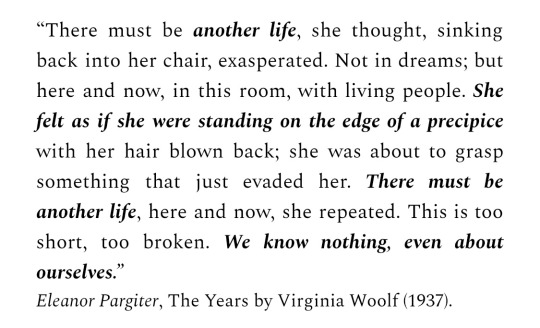

Eleanor Pargiter, The Years by Virginia Woolf (1937). x Rose De Witt Bukater, Titanic by James Cameron (1997).
#titanic#james Cameron#virginia woolf#Eleanor pargiter#the hours#parallels#rose dewitt bukater#classic literature#literature#film literature#film lovers#screenplay#screenplay literature#oceancentury#comparative literature#comparative
166 notes
·
View notes
Text

This WEBTOON and its fan base makes me lose so much hope for humanity. There are really people out there who think getting cheated on is worse than being enslaved and whenever someone points that out some imperialist simp will inevitably jump in like “bUt RaSHta dId X, Y, and Z” and it’s like yes, because the author CHOSE to villainize her. How bad is your reading comprehension??
This story could’ve been re written from Rashta’s POV and it would’ve been so different. Like people in the comments actually mock Rashta for being uneducated (she was a slave!) and paranoid (you would be too if you used to be a slave!)
Someone with a degree in comparative literature needs to study this WEBTOON’s success and its fan base.
#webtoon#the remarried empress#anti navier#pro rashta#socialism#manhwa#comparative literature#anti imperialism#white feminism
113 notes
·
View notes
Text
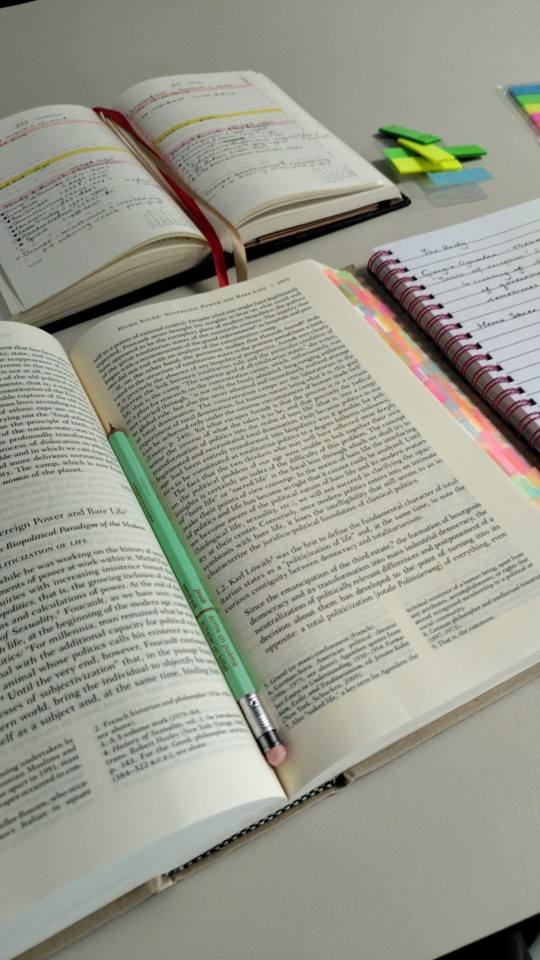
Recently I have been reading into Biopower and Biopolitics which finds its origins in Foucault. Agamben's "Homo Sacer" has been extremely interesting, especially because I wish to do some more research in Disability Studies. I am looking forward to reading Lennard J Davis.
#studyblr#study notes#dark academia#latin student#studyspo#comparative literature#literary history#uniblr#student life#research master#master's degree#studying#study tips#university studyspo#actually audhd#actually neurodiverse#actually autistic#actually mentally ill#living with adhd#actually adhd#adhd studyblr#dark academia asd#asd studyblr#autistic adult
172 notes
·
View notes
Text
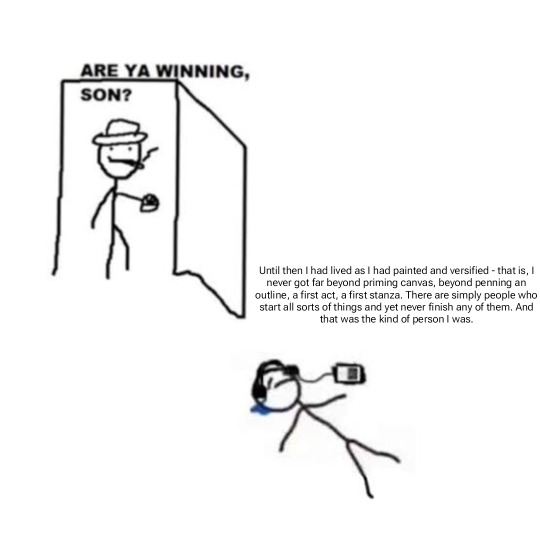
I'm not really having fun rn
quote from Venus in furs obviously
#venus in furs#venus im pelz#leopold von sacher masoch#leopold von sacher-masoch#sacher masoch#sacher-masoch#masoch#meme#literature meme#are ya winning son#19th century#19th century literature#german literature#austrian literature#late 1800s#1800 writers#1800s art#1870s#easthetic#decadence#austro hungarian empire#tw depressing thoughts#writer#book memes#book quotes#quotes#quote#classic literature#literature#comparative literature
45 notes
·
View notes
Text
yeah riverdale could write "these violent delights have violent ends", but shakespeare could never write "you haven't known the triumphs and defeats, the epic highs and lows of high school football" like cmon
#comparative literature#i'm so right like don't you dare come at the cw#art#riverdale#shakespeare#shitpost#romeo and juliet#archie andrews#riverdale cw#tv quotes#english literature#english lit#william shakespeare
58 notes
·
View notes
Text
which type of translation do you feel is the most 'accurate' regarding prose friction
Perserves literal meanig: focuses on the more surface level elements of the text, might lead to some akward sentences or word uses in new language, might leave clear traces of translation but mainly sticks to the literary devices of the original
perserves the vibes: might stray from original literary devices to more accurately get the mood, tone, ect across in the new language/culture. focuses on giving the readers the same feelings as they would if they were reading it in the original language.
#language#translation#linguistics#linguistic#language poll#language learning#translator#translated literature#literature#prose fiction#comparative literature
11 notes
·
View notes
Text
The following text was presented in Polish, under the title „Mortal deities of hidden thrones. Maximilien Robespierre in Thermidor as Stanisława Przybyszewska’s alter ego” during a comparative literature conference in May his year. My idea of in what part my PhD will be about her, and what I can and cannot publish before is still taking shape, but I really wanted to put this out here.
Stanisława Przybyszewska is remembered in the collective consciousness primarily as the author of „The Danton Case”, and secondly - as a lonely, unhappy person, living in isolation and enduring miserable living conditions of her own free will (in some sense even at her own behest). Thanks to this way of looking at her, it’s easy to classify her in the studies focusing on her, in various, constantly recurring orders, and everything that is less obvious than these two facts can be omitted equally easily. Since she is known mainly as the author of „The Danton Case”, naturally her second great drama, „Thermidor”, is being pushed to the side. And it is precisely here that her biography is reflected in the character of Robespierre, her idol and deity. When I talk about being reflected, I mean, of course, the construction of Robespierre as a person in a drama is done according to the same pattern that Przybyszewska's life in Gdańsk has followed.
What pattern was it? First of all, we are talking about an existence that is not only lonely, but also aggressively hermit-like. Przybyszewska is not only stubbornly stuck in Gdańsk, with which she had nothing in common with and which she didn’t even like, but she also rejected help from her family and the few friends; loneliness of this kind naturally involves a certain attitude towards the world and a certain view of the world. Here I would like to focus on the facts extracted from her biography, and only those that can be recorded in a somewhat visual way, because only this type of simple, inalienable information is the one that could have found a place in her drama.
The most important facts from Przybyszewska’s life: - Loneliness - Hatred - Hierarchical view [of the world/reality]
The first fact is loneliness, understood both in the physical and mental sense. The second was her hatred of people, which was not (most likely) a result of a flaw of character (unless we consider her severity to be a flaw), but rather of a complete misunderstanding that she met with at every step. In her opinion, this misunderstanding had a simple cause – it was her own genius, which she sensed and which she tried to develop in her creative work. The third fact is the specificity of her view of the world, based on a hierarchical view.
Facts from Robespierre’s life: [obviously I am talking only about his literary counterpart, and only in Thermidor] - Loneliness - Hatred - Being conscious of his existence within a certain hierarchy
Przybyszewska smuggles these three undeniable and simple facts into „Thermidor” as features defining one of the characters, Maximilien Robespierre. He also exists in seclusion - although he is undeniably the most important character in the play, he is not only absent throughout Act I, but he only exists when his absence is being talked about.
„And here we can refer to the geobiography, because Przybyszewska places her hero in conditions close to her own living situation: her Robespierre lives in a «Parisian cubicle resembling a kennel» and washes himself with icy water. [...] Robespierre's cold Parisian cubicle corresponds to the short description of a room in a barrack, made by Przybyszewska between 1927 and 1928 in a letter to her cousin, Adam Barliński: «a crumbling ice house, deprived even of running water»” (Marcin Czerwiński, „Uskok”) -> LONELINESS
Using historical knowledge, Przybyszewska places Robespierre's apartment in a lonely room in the house of a friendly family - but drawing from her own life, she definitely enhances the „vibe” of his place of residence in such a way that it corresponds as closely as possible to her own living conditions. This is not supported by historical evidence, because it is known that in the Duplay family, Robespierre occupied two comfortable and normally furnished rooms, the standard of which did not differ from the standards in 18th-century Paris.
„The present study, however, argues that in fact she takes a Gnostic view of history as an eternal opposition between matter and spirit, and that this dualism saturates the utopian project she undertook both in her art and in her life.” (Kazimiera Ingdahl, „A Gnostic Tragedy”) -> ASCETISIM
However, for Przybyszewska, deprived not only of the luxuries of everyday life, but also of even a semblance of normalcy, it seemed unthinkable to grant the person she depicted in her works - in „Thermidor” more than anywhere else - the very luxuries that she herself was deprived of, and which she didn't even miss that much. Przybyszewska loved Robespierre and considered him to be the highest being, which, due to her Gnostic view of the world, was combined with her love of asceticism. Asceticism, the rejection of the material world, is one of those practices that allow us to rise higher on the mental plane, so it was, according to her (and certainly: according to her Robespierre) indispensable of.
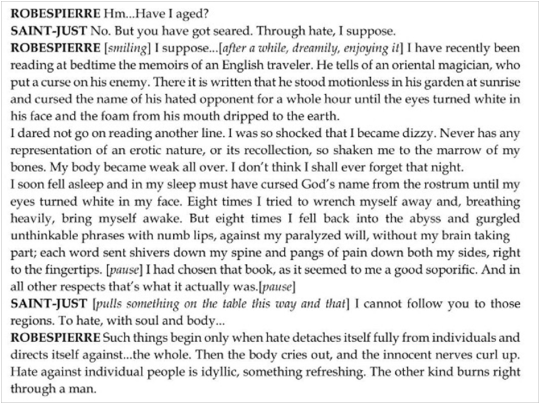
The second point of contact between the writer and the character is hatred. The topic as such appears frequently in her prose, but in her dramas it appears only in these two lesser-known ones; as if she couldn't write about hatred in a more „domesticated” way. Przybyszewska rewrote each scene in „The Danton Case” at least 4 times, usually 10 – „Thermidor”, however, is a play written first and not even completely finished, so there are a few stylistically jarring places in it. From the point of view of this essay, the most important thing at this point seems to be the description of hatred from the mouth of Robespierre himself.
„In fact: I literally had a fever while writing. Everything is boiling inside of me. I cannot give you any idea of how much I suffer terribly with this absolutely powerless rage in the face of stupidity. When I first read this article, I regularly felt physically sick: I couldn't eat for hours. Besides, the blood rushed to my head so much that I was careless by putting it under the tap. Such bodily symptoms never reach the level of rage in me because of my own affairs.” (Stanisława Przybyszewska, „Letters”) -> HATRED
This corresponds with Przybyszewska’s views; she spent her adult life without finding understanding or friendship among people (or at least friendship on her, harsh and inaccessible, terms), and so she felt hatred on a similarly physical level; even if she admitted that she didn't feel that way for personal reasons.
The same can be said about Robespierre, who hates not a single man, but what a man aspires to. There are more mentions of hatred in Przybyszewska's rich epistolography, and in the creation of Robespierre as a literary character in „Thermidor”, „The Danton Case” and „The Last Nights of Ventoese”, in fact, there are more - in this essay I only want to highlight this similarity as something more than similarity, as pouring of the writer's personal experience into the „personal experience” of the character.
„When you read and interpret [Przybyszewska's] correspondence, dramas and prose, after some time you begin to notice the constant presence of evaluations - of the world, people, their behaviors and achievements - with a dominant black, negative tone. Przybyszewska must always know and say precisely whether a person and a work are great and outstanding, or small and unsuccessful; whether she is dealing with the first or fourth „level” of creators. (Ewa Graczyk, „Ćma”) -> HIERARCHICAL VIEW
The third similarity is what Ewa Graczyk has called the „hierarchical view” and there can be no doubt that Przybyszewska - by adoring Robespierre, admiring him, idealizing him in her plays - transmits this trait of hers onto him not so much consciously, but because the hierarchical nature of her gaze is an inherent part of her as a person and she is unable to create a universum which would operate according to rules other than those she herself had adhered to. And hierarchization is closely related to hatred.
„During the winter, I suffered from a fear - as incredible as it was downright unpleasant - that I had come too far for my years. While last year with every page I wrote, bad and clumsy as they were, revealed to me the beginning of some line of development, thus marking all the directions of the path destined for me, which I immediately tried to follow - now this comfortable feeling of apprenticeship, of beginning, suddenly left me. I have not abandoned my path, the only one that suits my personality and that I have recognized from my mistakes. But the anticipated goal was achieved. Already. It terrified me. I thought I had gone all the way around in one year. There was nothing left for me to do but die.” (Stanisława Przybyszewska, „Letters”)
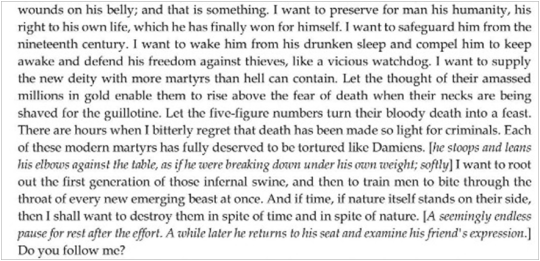
Robespierre, placed in a situation undoubtedly much easier to bear than Przybyszewska was, does not share with her similar dilemmas. Why? Because Przybyszewska all her life was afraid that she was not good enough - or maybe she was not so much „afraid” as she was convinced that she had not yet reached the peak of her abilities. Robespierre, on the other hand, although from time to time he may experience dilemmas related to not knowing whether he sees and assesses the situation correctly, knows for sure that although he may not be the greatest, at the same time, there is no one greater than him. Therefore, Przybyszewska's fear and uncertainty are not foreign to him; altough the same cannot be said about her irritation and anger, and not her appraising, mathematical view of other people.
It is clear that Przybyszewska poured her life experience into Robespierre; she probably did not have many other opportunities to narrate any literary work - in all her works not only the same themes or types of people are repeated, but also the same solutions and considerations. This results from her own character, but also from one more thing, closely related to the hierarchical view: her isolation took place at the ground level. This is both in its metaphorical and literal meaning: Przybyszewska lived in her barrack, rented to her out of pity, separated from others only by too thin walls, and nothing else. What is missing in her life is the introduction of some distance that would allow her to consider her situation as something other than - depending on her mood - a deep misfortune or a forced, but at least temporary, stop on the way to somewhere greater. It is a position on the same level as everyone else, or even worse than that: it is a position among people whom she considered lower than herself, but for which she had no evidence.
„During the winter, I suffered from a fear - as incredible as it was downright unpleasant - that I had come too far for my years. While last year with every page I wrote, bad and clumsy as they were, revealed to me the beginning of some line of development, thus marking all the directions of the path destined for me, which I immediately tried to follow - now this comfortable feeling of apprenticeship, of beginning, suddenly left me. I have not abandoned my path, the only one that suits my personality and that I have recognized from my mistakes. But the anticipated goal was achieved. Already. It terrified me. I thought I had gone all the way around in one year. There was nothing left for me to do but die.” (Stanisława Przybyszewska, „Letters”) -> GEOMETRY OF EXISTENCE
At this point, it is worth returning to this fragment and taking a closer look at the underlined fragments. Przybyszewska thinks about her life using vocabulary related to geometry (she briefly tried to study mathematics in her youth). However, this geometry is flat, located on one plane - a line, a circle, a designated direction. She has no space to breathe. And this is not only due to the forced pause in creative work, but also – more of an everyday problem - because of her room:
„My current apartment measures 2.25 x 4.60 metres. Measure it and you will see what it means. On top of that, there's a window – half a size of a normal one.” (Stanisława Przybyszewska, „Letters”) -> GEOMETRY OF EXISTECE
There is little space, then, in any sense of the word, and she can only spread her wings through Robespierre, whom she admires but whom she secretly would also like to be: his room, at least, is upstairs. I say this sentence a bit ironically (although it is true), just to emphasize that he actually had more space. And when he left, after he disappeared from the political scene for some time (as it is the situation at the beginning of „Thermidor”), he moved away from people in more than one dimension.
And this simultaneous elevation to heights, even if only heights of a second floor, and remoteness from people in every other possible respect, is what pushes Robespierre's opponents to understand him in terms of divinity. There is not much in it of praise, more of a statement of fact that must be accepted before it can be refuted. So what is Robespierre's divinity in Thermidor?

First of all, it is his inherent feature, the lens through which others must look at him. It's not just those who know him personally and work with him - it's about France in general. But the point is not to list all the moments in which one of the characters recognizes Robespierre as a god - let's consider it as a fact, just as they recognize it, and let's get over it to ask ourselves: what does this mean?




The main meaning is panic. Przybyszewska, through Robespierre, at least partially fulfills the dream of achieving success and the associated with it strong reactions of the world to the presence of such a successful person. Fear in this case is the highest form of flattery, except perhaps sincere (really sincere) devotion. This fear is both an expression of hateful admiration and a driving force behind the characters' actions. It results from a reluctant but unwavering faith in the divinity of their opponent and it is transformed into taking action, into an attempt (as history shows and as Przybyszewska would have shown in the play if she had completed it: a successful attempt) to overthrow the one who is a god, but not a guardian. Whoever keeps his divinity locked inside himself cannot get rid of it, but he does not make it a gift to others, but rather a curse to himself.

-> MORTALITY OF A DEITY
Because Robespierre is a mortal god. Przybyszewska created thorugh him something like a parody of Christ: a man-god in whom each nature is equally weak and each loses. Since each of them loses, then, unlike Christ, each of them dies. He actually „is burning in the blast furnance of his spirit” - because he makes decisions that bring about his own destruction. This is similar to the situation of Przybyszewska, who – so it would seem - did everything in her power to alienate the people on whose financial support she depended; who stubbornly stayed in Gdańsk instead of moving to one of the cities where she could receive more help from her family; who refused to undergo addiction treatment even under the threat of losing her government stipend. Her own non-humanity is inscribed in her through pride, to which she openly admitted and called „satanic” – she is linked with mortality in the same way.


In Robespierre, humanity and divinity combine in an unusual way: he worships himself, he’s convinced of his extraordinary power, and every matter he undertakes confirms this belief. But what is a monstrance if not a kind of visible concealment? What is the meaning of his long, six-week stay outside the French political scene at a time when he is needed there the most?
In her book „FORMS: Whole, Rhythm, Hierarchy and Network”, Caroline Levine proposes the introduction of the term „affordance”. An affordance is an action that is hidden in a given object or concept; an action forced, as it were, by a form that is itself a kind of oppression. In „Thermidor”, the form that has the greatest importance for the plot is an enclosed space. On the one hand, we are talking about the meeting room of the Committee of Public Safety (Przybyszewska preserved the unity of the place in the drama), and on the other - about Robespierre's apartment, which is only briefly mentioned.

-> AFFORDANCE OF HIDING
His withdrawal and his absence create anxiety among his opponents. The fear mentioned earlier is related to how the other revolutionaries feel about Robespierre as a person - but there is more to it than that. His absence, which does not prevent him from having a perfect understanding of the political situation at that time, has something uncanny about it. He himself puts it best: “There is something uncanny about this business. It is as if one discovered venomous teeth in a paper snake, or a hangman's rope in a young girl's sewing case [...]”. There is a reason why these comparisons make us feel uncomfortable: they violate the natural affordances of the cases mentioned, since paper should not be venomous and a sewing case should not contain a hangman’s rope. A room in a family home should not in any way resemble a place where a dangerous animal lurks [in the Polish version Robespierre is being likened to a spider] - and yet Robespierre evokes this type of association in others, probably without being fully aware of it himself.


„I remember that I saw her several times in the morning hours, walking from her apartment (in the barracks) through the courtyard of the Gimnazjum Polskie, sideways and stealthily, so much so that it was difficult to see her face.” (Ewa Graczyk, „Ćma”) -> COMING DOWN TO EARTH
His throne – his altar – is hidden, therefore it’s deprived of contact with the earth and its inhabitants. When, after a few weeks of absence, he decides to come down, he causes not only panic, but also simple surprise. This is not far from the personal experience of Przybyszewska, who at some point began to avoid going outside, and when circumstances forced her to do so, her appearance caused quite a surprise among onlookers - and (just like Robespierre) she was at odds with people both on „the sidewalk plane”, and on the mental plane.
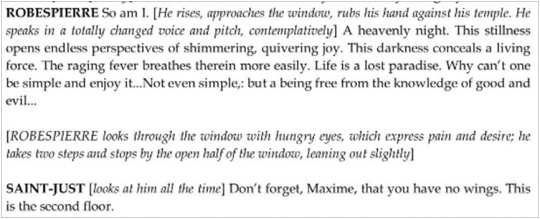
-> FALLING DOWN ONTO EARTH
However, the mere physical descent to earth does not mean that Robespierre has left the spiritual and mental heights on which he dwells as a deity. Saint-Just's warning is not just mere words, but an expression of concern about the entire situation that Robespierre has just unfolded before his eyes - a situation that is almost impossible to solve and poses a real threat to the „paradise on earth” for Robespierre is the Republic. Falling from a height is also a threat to the spirit and a reference to the fall of Satan.
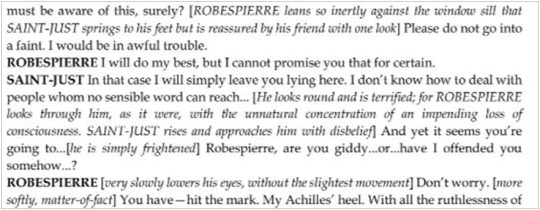
-> A LITERAL FALL
It is also simply a signal of the beginning of defeat. The affordance of the closed room was violated, so by getting rid of his loneliness and separation, Robespierre also deprived himself of their positive aspects. The mortal god descended to earth, thereby shedding the protective layer provided by the distance between himself and others, between his plan and the reality in which he lived - and his opponents, whether in human form or in the form of a natural course things, they immediately took advantage of the situation. And here we can find a reference to the situation of Przybyszewska, who at some point started to avoid seeing her friends from Gdańsk – a married couple Stefania and Jan Augustyńscy - because Stefania was, in Przybyszewska's opinion, too perceptive and did not fall for the artificial distance put between them through the words of „Everything is fine”. Thus, the writer trapped herself in the form and allowed it to turn into a prison. This kind of action somehow justified her and took away the responsibility for improving her life.
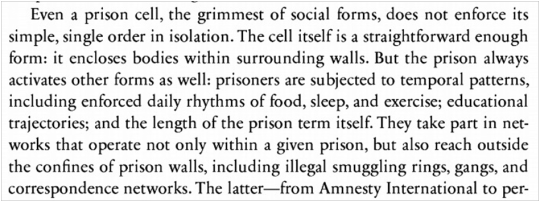
(Caroline Levin,e „FORMS: Whole,Rhythm, Hierarchy, Network) -> AFFORDANCE OF ISOLATION
Any form is a type of oppression. By imposing its order, it also forces the way of seeing and thinking. Robespierre's paranoia did not appear out of nowhere - it is the result of isolation (the only person who acts as a link and a buffer between the closed form of Robespierre’s private room and the closed form of the meeting room is Saint-Just - and Saint-Just has been struggling with the war on the Northern front for several weeks). It is no different with Przybyszewska herself, whose attitude towards the world was largely dependent on her financial conditions, which she did not try to improve: "Since [Staśka] is not crushed by the grey of everyday and by the struggle for a piece of bread, the general hatred towards people and constant fear of them ceased” wrote her husband in a letter to Helena Barlińska.

-> THE DUAL NATURE OF AFFORDANCE
When it comes to affordance, there is one more detail we need to pay attention to. The physical form - in this case, a room - influences the spiritual form, but it also works the other way around. Robespierre's paranoia is therefore a factor whose affordances (e.g. haste, keeping a secret, high treason) have a real, negative impact on the Republic in general and his life in particular. Acting under the influence of the conditions he himself has created, he finds himself on the road to making more and more mistakes, making the situation worse, and driving himself into a dead end. The fact that he does not seem to take this possibility into account points once again to his divinity and the pride that comes with it.

-> THE AFFORDANCE OF ROBESPIERRE
From the depths - and heights - of his tabernacle, Robespierre commands the situation. He exerts an absolute influence, which at the same time is based on nothing more than his person. Therefore, it is his personal affordance, the effect not of a specific action, but rather the result of his presence in the world, the resultant of all his features. This is where he differs from Przybyszewska, who dreamed of having such an influence on the masses, or at least on a group of people. Thus, this confirms the thesis about constructing Robespierre in „Thermidor” as her alter ego - similar enough to be confused with her, but better and more powerful.
I would like to end here and take advantage of the opportunity to mention that after 216 days of genocide in Gaza, as of the day I have delivered this essay, there is no university left there. We have the right and opportunity to promote science, and therefore we also have an ethical obligation to stand on the side of the victims of genocide, who were deprived of this right and opportunity. I hope that in our lifetime we will see a free, independent Palestine.
#I WHOLEHEARTEDLY ENCOURAGE YOU ALL TO ALWAYS MENTION PALESTINE WHEN YOU'RE GIVING A SPEECH#IT IS WORTH IT AND WE ARE MORALLY OBLIGATED TO DO IT#stanisława przbyszewska#stanislawa przybyszewska#thermidor#maximilien robespierre#maksymilian robespierre#robespierre#affordance#ewa graczyk#marcin czerwiński#caroline levine#kazimiera ingdahl#literary analysis#comparative literature
30 notes
·
View notes
Text

Unclip my Wings
Why use this phrase when Alastor laments the deal he is stuck in?
tl;dr: skip to midway down to So here is the Proposed Theory. I don't want to ruin the build up and you'll probably figure it out after with all the pictures I chose. It's not Lilith.
But after watching the Pilot episode of Harbin Hotel (of course I watched after I binged the entire season), I had a new appreciation for Alastor and his function at the Hotel.
But the main question we have is WHY? Why is a demon as powerful as Alastor at the Hotel in the first place? Why is he acting as the general manager? And then Husker gives up that little piece of information that Alastor is also bound to someone. Now we're asking WHO?
Who could possibly have enough power to contain a demon as strong as Alastor. Of note is seven year absence which remarkably coinsides with Lilith's disappearance. But that seems a bit too coincidental.
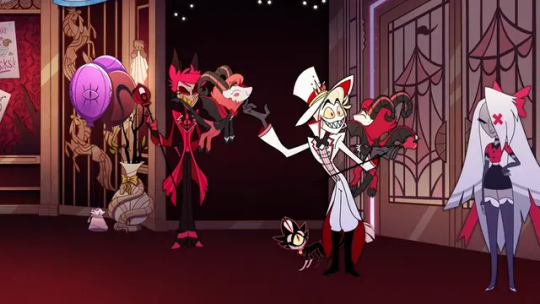


During the meeting with Lucifer, Alastor's constant angry glaring at Lucifer indicates he has certain underlying issues not addressed. Then Lucifer's agressive dismal of Alastor at their first meeting. It brings to mind the quote "[He] protests too much." Then the imagry during the "Dad Beat Dad" song where Lucifer has Alastor's head on a platter, having Alastor in a frying pan, and baked in a pie.

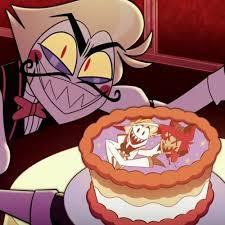
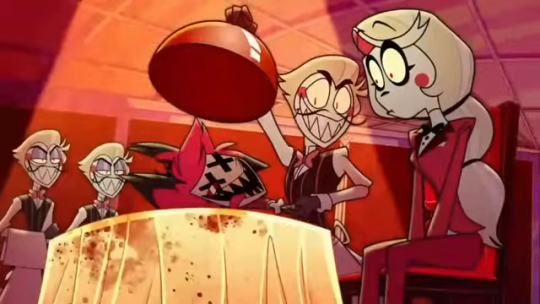
These images are blatant displays of power over the victim. And Lucifer seems to relish these images far too much, to the point displaying out right disturbing glee at having Alastor in the frying pan.
Alastor counters with needling about exactly what bothers Lucifer the most. Charlie.
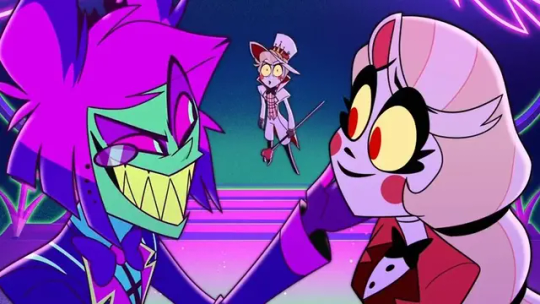
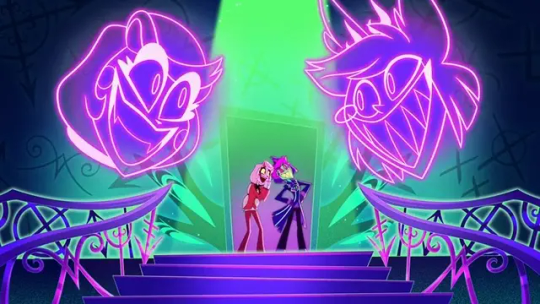

Gaining Charlie's loyalty appears to be Alastor's primary objective. He hasn't actualy made it a secret that he would love to make a deal for Charlie's soul. In fact the Brady Bunch style picture is all about boxing Charlie in.
Which begs the question of why would Alastor want Charlie's soul? What could he possibly need such a powerful bargaining chip for? Who would do anything to free Charlie from such a deal?
We know Lucifer would.
WIthout knowing Lilith's side of the story, we're at a loss as to her choice. But the fact that she was in Heaven during this entire show thus far, gives an indication that she wants nothing to do with Hell.

So Alastor is searching for a way out of his deal and he has set his sights on Charlie.
In the pilot Alastor is in the news room watching Charlie fail to generate interest in her hotel. He offers his services which Charlie turns down many times. He spends a fair amount of time staring at the portrait of the Morningstar family. He claims to want to help for the entertainment value, which is a much lighter excuse than trying to infiltrate Charlie's trust.


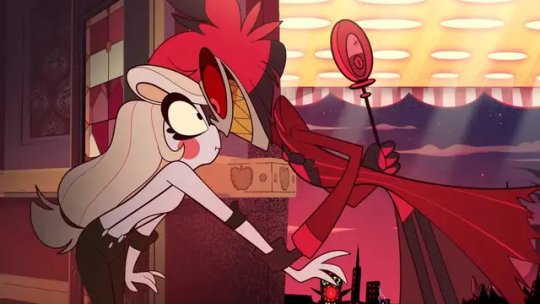

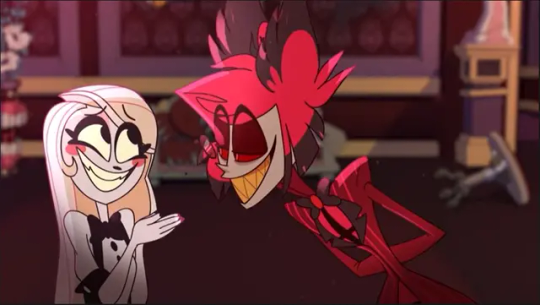
It ends with Charlie agreeing, but without any sort of deal being made.
The phrase "Unclip my Wings" during the final song kept bothering me. It seemed unusual for a demon to reference wings as the majority of characters with wings are Angels. (Husker is something different, more gargoyle) Besides having the excellent rhyming for the phrase "pulling all the strings" it begs the question of what if Alastor actually had wings at some point? Unlikely, but what if he had had a taste of Angelic power and wants it again. If he had Angelic powers no one could stop him from pulling the strings.
Wings are also symbols for freedom. And Alastor clearly wants his freedom more than anything.
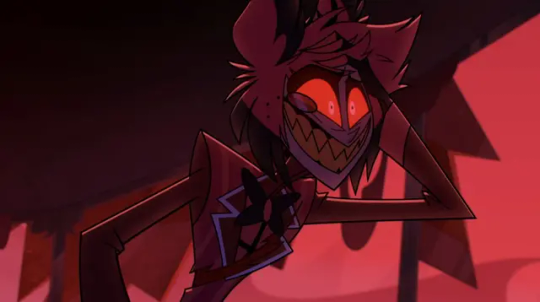
Which brings up the point of why did Alastor sell his soul in the first place? What did he possibly want so bad as to give up his freedom?
Before his disappearance Alastor was killing the major Overlords, creating power vaccums he no doubt exploited. Making him one of the most feared demons in all of Hell. How would the King and Queen of Hell react to a mortal soul beginning to rival them in power?
Wouldn't it make sense to attempt to control this Demon so that it does not upset their power?
Neither Lilith nor Lucifer appear very hands on with ruling Hell. In fact, Lucifer doesn't appear in the last battle until Adam expressly threatens Charlie and Charlie is not capable defending herself. Lucifer does apologize for not being there sooner. So why? What was holding him back from fighting alongside his daughter when he cares so much for her? Is there something that literally holds him back from interfering in the Extermination or with the ongoings of Hell in general?
If so, it would make sense to have someone else deal with the out of control demons.
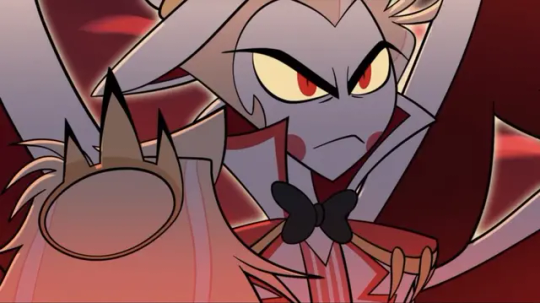
But he does stick around for the rebuilding of the hotel, which Alastor is absent for.
So here is the Proposed Theory
In order to get control of the disruption of Alastor killing off Overlords and to prevent Alastor from becoming so powerful as to kill Lilith or Lucifer, Lilith meets with Adam and gets the Extermination started to limit how much power Alastor can gain from collecting souls.
Meanwhile Lucifer is part of the plan, but isn't particularly thrilled. What he doesn't know is that Lilith made a deal with Adam. Nor that Lilith got to lounge around in Heaven for getting Lucifer to agree to the Extermination.
Lucifer captures the biggest threat he knows, Alastor the Radio Demon. At this point Alastor has killed all the Demon Overlords that threatened his rise to power, so it stands to reason that Lilith might have attempted to stop the rouge demon and perished.
Alastor is now caged by Lucifer and wants his freedom.
Alastor is in a position where he is willing to make a deal with the King of Hell himself.
Lucifer is a creator. We see him build rubber ducks at first then recreating the Hazbin Hotel for Charlie. He does not want any more destruction or carnage. But when Charlie starts the Hazbin Hotel to rehabilitate sinners, Lucifer wants to help, but can't.
What he does have is a powerful demon who would do anything for a taste of freedom.
Lucifer makes a deal for Alastor's soul.
The evidence?
Alastor's absolute hatred for Lucifer
Alastor seeking a deal with Lucifer's daughter

Alastor gleefully gloating over Charlie's trust in him


Lucifer's ability to manipulate Alastor's outfit and postures
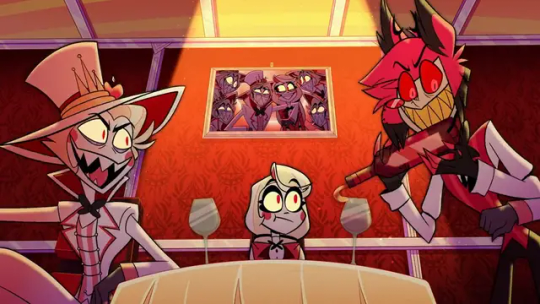

Lucifer's glee at presenting Alastor's severed head


Lucifer enacting violence against Alastor
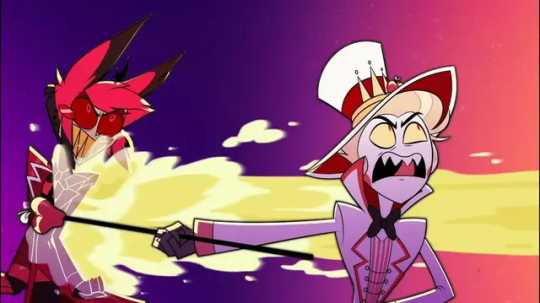

Alastor not seeking retaliation
Alastor's eyes seeking his prey, making sure Lucifer knows

This image where Alastor and Lucifer are nose to nose, glaring with bared teeth is perhaps the only time that Alastor's smile is close to cracking. It is also striking that Alastor's grin is nearly identical to Lucifer's in that it takes up half the face it is so large.
As Alastor said, there is no telling what is behind a smile, particularly when it is designed to confuse your enemies.
Lucifer cannot interfere with the ongoings of Hell. Lilith wants nothing to do with Hell at this point. Charlie is determined to reform sinners and Lucifer wants to protect his daughter.
Lucifer is furious that he has to rely on a demon to help his daughter when that is all he wants to do and constantly shows his superiority over Alastor whenever he gets a chance. But does not tell Charlie any of this because he doesn't want her fury or believing that her father doesn't think she can accomplish it by herself.
Not helping in the Battle against Adam until after Alastor is out of the fight, could easily be Lucifer's way of proving Alastor cannot protect Charlie. Coming in to save the day could be Lucifer proving his worth as a father.
Either way it is far to convenient for Alastor to show up when Charlie is announcing her Hotel. Alastor's soul is owned by someone who would release it should Charlie be the bargaining chip.

Only time will tell what the truth is.
Here's to hoping I don't predict anything, because I want to be surprised. Which is why I watch most things because it is the HOW did it happen rather than WHAT happened that keeps me going.
#hazbin hotel#alastor#hazbin alastor#hazbin lucifer#lucifer morningstar#hazbin lilith#charlie morningstar#hazbin charlie#charlie hazbin hotel#alastor hazbin hotel#the radio demon#alastor the radio demon#fan theory#who owns Alastor's soul#lilith morningstar#comparative literature#comparative lit major at work#i spent too much time on this#hazbin hotel theory#hazbin hotel thoughts
38 notes
·
View notes
Text

^ Our work for class next week. Our professor went onto AO3 and chose a random anime and the first thing that popped up was rated E, and the tags omg. The professor did not seem to notice
I love this class
#comparative literature#literature#lit blog#shitpost#archive of our own#ao3 fanfic#ao3#fanfic#fanfics#she is really cool tho#she gave us cute keychains
49 notes
·
View notes
Text
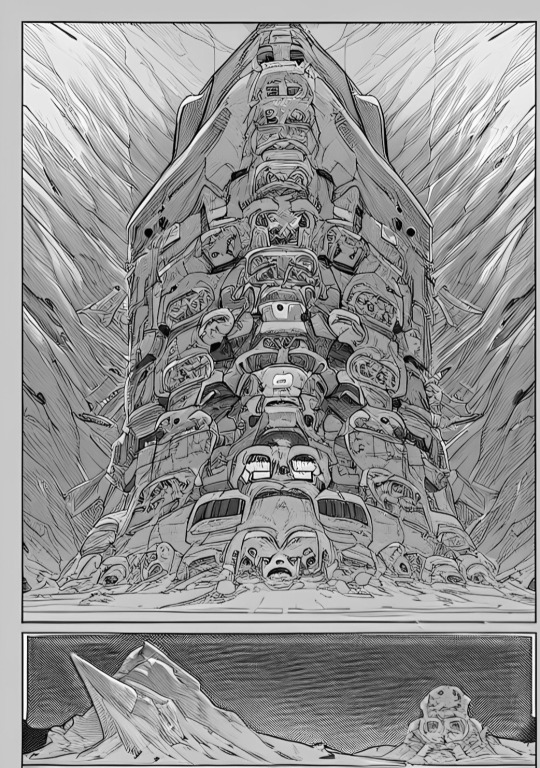
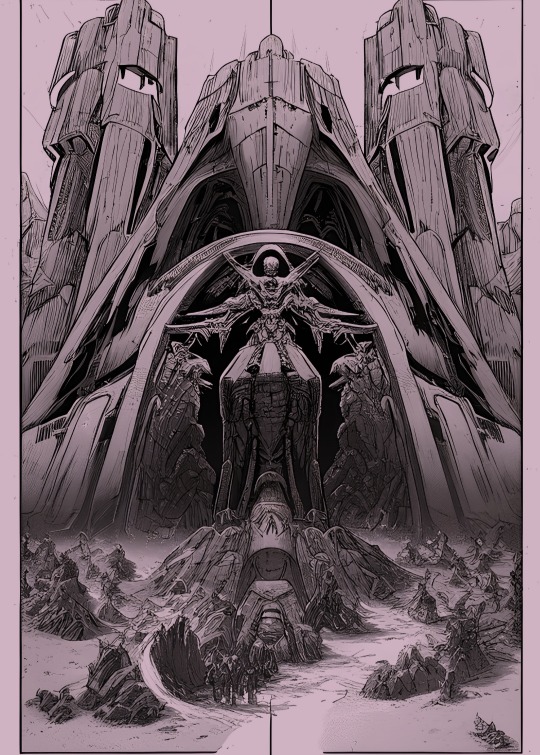
Dune inspired artwork inspired by H.R. Gieger inspired by Frank Herbert
2023
#dune#dune art#hr giger#retro scifi#sci fi and fantasy#artists on tumblr#artwork#scifiart#frank herbert#sandworm#horror#alien art#out of this world#otherworldly#m class#classical literature#reading is sexy#comparative literature#art history#nerd alert
22 notes
·
View notes
Text
Anxiety of influence more like anxiety of wait. Who is that.
Mr. Writer sir I don't know who it is that made you write like that but I can sense him in the text. You knew and cared who he was but I don't know him. I only know you. And he's here through you but he's a stranger to me.
Good for him that he let you be changed into art. You won. Are you happy?
#comparative literature class give me more wrong models of writerly psychology#i'll be normal about them i promise#anxiety of influence#harold bloom#<-guy who i hope i don't have to read more of#literature#comparative literature#and because he's always there:#herr moses in berlin
15 notes
·
View notes
Text
I remember back in 2011, I was taking a Comparative Literature class in college and the professor was talking about all the idiomatic expressions and metaphors used to describe sex and how they were all violent, warlike. Nailed, banged, screwed, smashed, destroyed, pounded, broken in, etc. Someone scores, someone loses their virginity. It's a battle to be won or lost. He challenged us to try to think of a metaphor for sex that was nonviolent and egalitarian.
I timidly raised my hand and offered, "A dance?" The professor shut me down pretty quickly, scoffing, "When was the last time you heard anyone use dancing in that context?"
Anyway, Steven Universe came out a couple years later
#steven universe#fusion#also i think some ppl use 'horizontal tango' so fuck that guy lmao#tales from comp lit#steven universe meme#sexuality#idioms#metaphor#comparative literature#literature#media
13 notes
·
View notes
Text
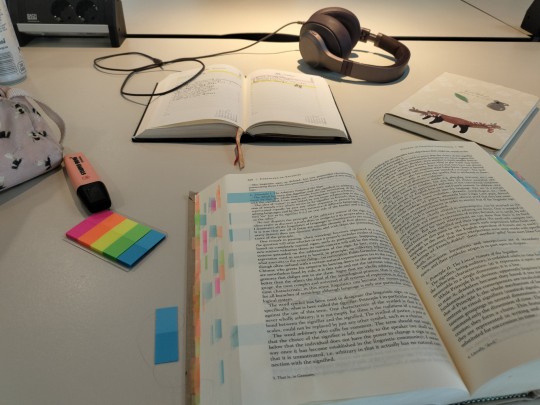
The last few days I have shifted over to a study of language and deconstruction, I have finally finished my readings of Derrida as well. From there I moved to postcolonial theory, which is one of my huge special interests.
If anyone would be interested in talking about literary theory, feel free to contact me!
#studyblr#study notes#dark academia#latin student#study tips#studying#studyspo#comparative literature#literary history#university studyspo#autistic#actually autistic#actually adhd#actually audhd#audhd studyblr#derrida#foucault#franz fanon#gilles deleuze#comparative lit student#university student#uniblr#university#student life#study motivation#study space#study hard#summer study
104 notes
·
View notes
Text
"Darkly coloured, the steed cuts through the gloom of night with its blackness, between his eyes a blaze like the crescent moon."
- an Arabic poem by Antara ibn Shaddad (see Arberry, Arabic Poetry, p.35)
"Nimbly did Sleep slip down from the ethereal stars, cleaving the shadowy air and scattering the darkness.
- Vergil's Aeneid, Book 5 (ln. 838-39)
#arabic poetry#arabic literature#latin literature#aeneid#tagamemnon#classics#poetry#epic poetry#comparative literature#vergil#latin#antarah#antara#الشعر العربي
15 notes
·
View notes
Note
I saw your post about orientalism and I was glad to see that I am not the only one who wanted to know more. I am eager to dive into your list, but I was wondering if there's a major/ course that focuses on orientalism? Maybe something online? Thanks!
Hi nonnie! Orientalism is actually quite common these days as a module if you're studying in majors like: Literatures in English, Arab and Islamic Studies, Comparative Literature, Cultural Studies, Gender and Queer Studies, Race Studies, Area Studies, and definitely History. Some universities even have Orientalism as a separate major on its own, which is pretty freaking dope if you ask me.
I tried looking up online courses for you, but honestly since that is not how I studied, I don't want to recommend a course and it turns out shitty or eurocentric lol
If you or anyone wants to shoot me a message asking for specific references, my DMs are open!
The list of videos/references to understand more about orientalism mentioned by nonnie
#orientalism#literature#arab and islamic studies#comparative literature#cultural studies#queer#queer studies#gender studies#race studies#area studies#history#reference#regulusrules answers
3 notes
·
View notes